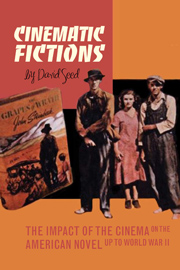Book contents
- Frontmatter
- Contents
- Introduction
- 1 Beginnings
- 2 Modernist Experiments: Gertrude Stein and Others
- 3 H.D. and the Limits of Vision
- 4 Ernest Hemingway: The Observer's Visual Field
- 5 Success and Stardom in F. Scott Fitzgerald
- 6 William Faulkner: Perspective Experiments
- 7 John Dos Passos and the Art of Montage
- 8 Dreiser, Eisenstein and Upton Sinclair
- 9 Documentary of the 1930s
- 10 John Steinbeck: Extensions of Documentary
- 11 Taking Possession of the Images: African American Writers and the Cinema
- 12 Into the Night Life: Henry Miller and Anaïs Nin
- 13 Nathanael West and the Hollywood Novel
- Bibliography
- Index
1 - Beginnings
- Frontmatter
- Contents
- Introduction
- 1 Beginnings
- 2 Modernist Experiments: Gertrude Stein and Others
- 3 H.D. and the Limits of Vision
- 4 Ernest Hemingway: The Observer's Visual Field
- 5 Success and Stardom in F. Scott Fitzgerald
- 6 William Faulkner: Perspective Experiments
- 7 John Dos Passos and the Art of Montage
- 8 Dreiser, Eisenstein and Upton Sinclair
- 9 Documentary of the 1930s
- 10 John Steinbeck: Extensions of Documentary
- 11 Taking Possession of the Images: African American Writers and the Cinema
- 12 Into the Night Life: Henry Miller and Anaïs Nin
- 13 Nathanael West and the Hollywood Novel
- Bibliography
- Index
Summary
Literary Impressionism: Stephen Crane and Others
As early as 1891 Thomas Edison began experiments with a ‘kintoscope’ (later called ‘kinetoscope’), which would become the first movie camera. Only three years later this device featured as a ‘visual telegraph’ in John Jacob Astor's novel A Journey in Other Worlds, where it has become elaborated into a means of transmitting live video sequences. The instance is symptomatic of the 1890s, when references to visual technology began to be evident in American fiction. The period from the mid-1890s to 1920 marks a transition between such early references to a situation in which film has become fully recognized as a cultural medium. This chapter addresses features of this transition.
Stephen Crane's 1895 classic The Red Badge of Courage is frequently taken to be one of the most important examples of literary impressionism, in which the narrative information is limited to the sensory horizon of its protagonist Henry Fleming. His point of view is rendered in terms similar to that of a mobile camera. The composition of scenes shows a proto-cinematic awareness of movement. Take for example the opening of chapter 11. First Crane gives us an atmospheric establishing shot in which first clouds – traditionally a sign of foreboding – and then men are described: ‘Great brown clouds had floated to the still heights of air before him […] The woods filtered men and the fields became dotted’.
- Type
- Chapter
- Information
- Cinematic FictionsThe Impact of the Cinema on the American Novel up to World War II, pp. 7 - 25Publisher: Liverpool University PressPrint publication year: 2009



